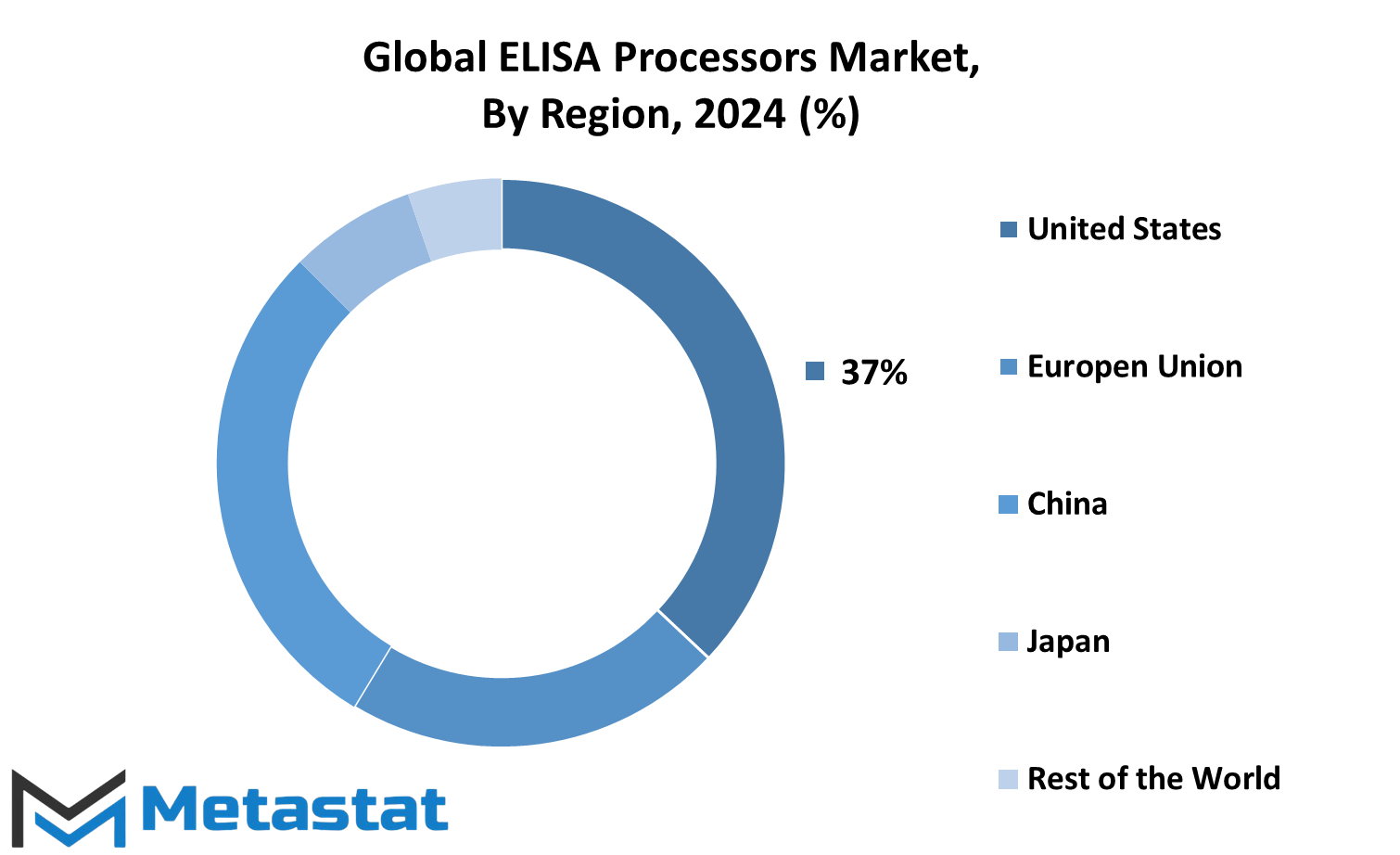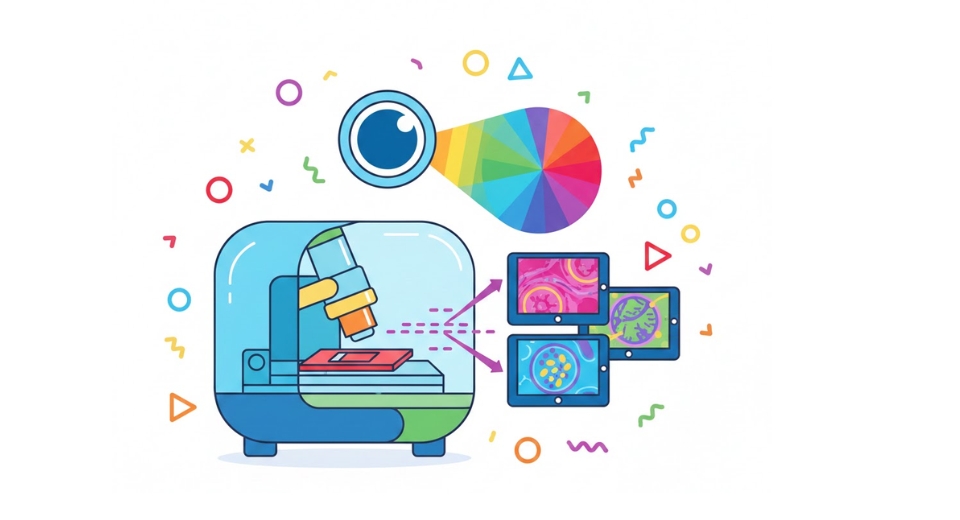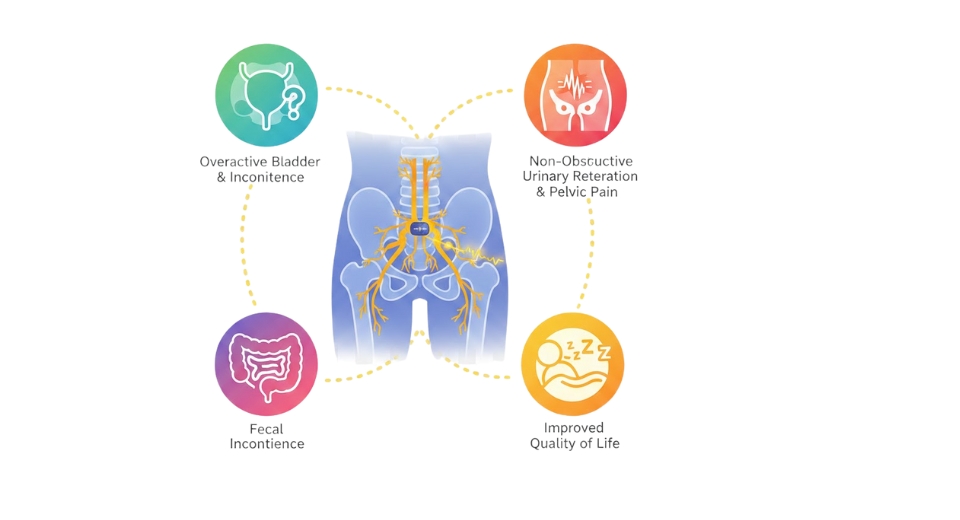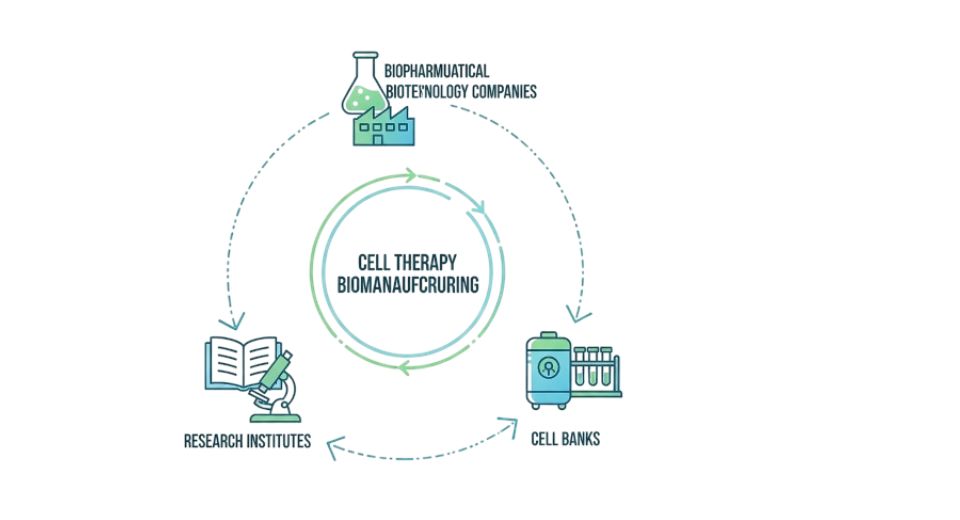MARKET OVERVIEW
The Global ELISA Processors market is a niche segment within the broad biotechnology and diagnostic markets. An immunoassay processor is high-tectonic equipment, specially designed for the automation of the ELISA process, one of the essential methods of detection and quantitative determination of substances, such as proteins, antibodies, and hormones in biological samples. The market fulfills requirements for automated systems in diverse organizations, including both high-throughput laboratories and clinical diagnostics and research institutes worldwide.
Over the past few years, the Global ELISA Processors market has been growing very fast, driven by technological innovation. Those new generations of more advanced systems, developed by Ellab, have revolutionized the workflow in a laboratory by increasing the accuracy and efficiency of studies. Advanced features associated with modern constructions include a touch-screen interface, auto plate handling, and advanced software for data management and analysis. These innovations reduce manual intervention, minimize errors, and streamline the entire ELISA process, making it more accessible and reliable for end-users.
Therefore, the demand for ELISA processors is likely to increase as diagnostic requirements diversify. A major force lies behind this: the rise in chronic and infectious diseases, demanding timely and reliable diagnostic equipment. In this case, ELISA processors provide such a solution with high sensitivity and specificity features largely important in detecting and monitoring diseases. Moreover, the continuous research being done on areas like immunology, oncology, and pharmacology results in further demand for ELISA processors, as these devices are just essential in all of these analytical applications. Regulatory dynamics and standards are also being modified in the Global ELISA Processors market. Products meeting stringent regulatory requirements would be successful in instilling the assurance of the diagnostic test safety and effectiveness among healthcare providers and patients. ELISA processor manufacturers have to expend heavily toward meeting these standards. It continuously works on enhancements in product compliance with the changing guidelines of regulatory bodies like the FDA and CE.
The more so that the Global ELISA Processors competitive landscapeателиrepresents businesses where there are both well-established market players and completely new ones. The top companies have a competitive presence and continue to innovate their designs to develop differentiated products that provide the best features with high efficiency. There are many examples of companies expanding their businesses by entering into a contract, partnership, or agreement to explore mutual benefits from core competencies and jointly entering multiple regions. For instance, the collaboration between instrument manufacturers and reagent suppliers could provide comprehensive solutions, through this: help relatively better in meeting the diverse needs of end-users.
One certainly expects further integration of innovative technologies, such as artificial intelligence and machine learning, into the ELISA processors on a global level in the future. Such developments are geared toward enhancing the analytical capacity of ELISA processors through increased precision and speed in delivering results. In addition, the trend toward miniaturization and portability of ELISA systems will lead to new applications for point-of-care diagnostics beyond the confines of traditional laboratories. The ELISA processors marketplace is energetic and growing, being pushed by technological improvement, regulatory norms, and the inflating demand for precise diagnostic tools. With the landscape of health and research changing fast, ELISA processors become more quintessential to accurately and efficiently process and analyze biological samples. Exciting opportunities for this market in the future are envisioned with such innovations being made, which are expected to further build the impact and applicability of this feature across a broad domain.
Global ELISA Processors market is estimated to reach $17,902 Million by 2031; growing at a CAGR of 7.1% from 2024 to 2031.

GROWTH FACTORS
The global ELISA Processors market is likely to witness remarkable growth in the coming years. It is one of the key driving factors; the surging demand for automated and high-throughput diagnostic solutions in healthcare is on its ever-high rise. With a view to enhancing efficiency and accuracy, healthcare systems the world over are looking toward the ELISA Processors as an important solution. These processors help laboratories process a better volume of tests with higher precision and speed, thus becoming an integral part of modern diagnostic practices.
The other critical growth factor is the rise in chronic diseases; there has been a lot of uprising cases of diabetes, cardiovascular diseases, and cancers, whose diagnosis and treatment greatly involve accurate and effective diagnostic procedures. It has an ELISA processor that provides leading performance accompanied by uniform results of high accuracy, which is an important feature for managing and treating chronic diseases. As populations globally continue to age and chronic diseases are on the rise, so will the ever-increasing call for advanced diagnostic tools like ELISA Processors. Despite these growth factors, however, the market does sincerely have some challenges. One major drawback is that high initial investment costs for ELISA processors keep some healthcare facilities especially smaller clinics and laboratories—from co-enjoying these benefits. This device demands huge financial outlays not just during purchase but also during continual maintenance and operation. This may eventually curtail the diffusion of ELISA processors, especially in areas with limited funding for health care.
Another obstacle is the stringent regulatory requirements and standards related to medical devices. While compliance with these regulations is needed for ascertaining that ELISA Processors are safe to use and function efficiently, doing so can be complicated and very expensive. Companies in the market have to navigate through a sea of rigorous testing, certification, and approval procedures, which reduces the speed by which new products and innovations reach the market.
However, the future holds new promises for ELISA Processors with the integration of artificial intelligence and machine learning technologies. These advanced technologies will be able to revolutionize this area of application because they have huge potentials for enhancing data analysis and interpretation. AI and ML would further enhance diagnostic accuracy and efficiency, hence making the ELISA Processors more effective. Above all, speed and accuracy in processing vast amounts of data will become quite imperative as the number and complexity of diagnostic tests continue to increase. Even as the global ELISA Processors market is going through many challenges high initial costs and stringent regulatory requirements, among others, the increasing demand for automated diagnostic solutions and the rising cases of chronic diseases are some of the major growth drivers. The potentials of the integration of AI and ML technologies into ELISA Processors open up a lot of lucrative opportunities in the coming years.
MARKET SEGMENTATION
By Type
The scenario for the ELISA processor keeps on changing day by day with the rapidly advancing world of medical diagnostics today. The devices form a substratum for laboratories all over the world by helping in identification for many diseases through their advanced capabilities in analysis. The global ELISA processor market is segmented into Optical Filter ELISA Analyzers and Optical Grating ELISA Analyzers.
These ELISA analyzers make use of state-of-the-art optical filtering to achieve appropriate detection and measurement of biomarkers in biological samples. At such levels of sensitivity and specificity, this technology finds a broad range of applications in both clinical and research uses. High capacity for filtering light wavelengths by these analyzers enables detection and quantification of some substances that are of essence in diagnosis and monitoring for infectious diseases, autoimmune disorders, and cancer.
In contrast, Optical Grating ELISA Analyzers make use of grating-based optical systems to achieve higher resolution and accuracy in detection. These include diffraction gratings that split and then reorient light for highly informative spectral studies of sample reactions. This high precision in light dispersion and its intensity control provided by the grating technology enables such an analyzer to generate reproducible results using all kinds of samples and formats of assays.
By Mode
These devices are one of the most important constituents of modern healthcare in diagnostic technology. They help detect traces of some substances, like proteins, antibodies, and hormones, in biological samples. On the basis of operational modes, the global ELISA processor market is segmented into two broad categories: Automated ELISA Analyzers and Semi-Automated ELISA Analyzers.
Automated ELISA Analyzers represent the epitome of efficiency in diagnostic laboratories. These are completely automated systems, which reduce human intervention and the potential for human error. Sophisticated robotics and software algorithms drive everything from sample preparation to mixing reagents and data analysis with a high degree of accuracy. This not only adds to accuracy but also increases the rate at which tests can be carried out, enabling laboratories to handle a larger number of tests within a shorter period. With increasing healthcare needs globally, automated ELISA analyzers are sure to form the backbone in tackling such challenges effectively. At the other end, semi-automated ELISA analyzers strike a middle path between manual labor and automation.
They require partial dependency on human resources while handling samples during preparation and end-user interaction and automate other reagent dispensing and plate washing. These analyzers find a place where flexibility in the test protocols may be desirable or where the number of tests does not warrant fully automated systems. They provide reliability and reproducibility of results while allowing laboratory technicians to exercise their expertise in critical areas of the diagnostic process. The potential of ELISA processors will continue to grow as technological changes are harnessed by innovation in the future. Increased sensitivity and specificity of assays, reduced turn-around time, and integration with AI for real-time data analysis could be some areas of future development. In addition, cloud computing and connectivity solutions will be embedded in this device, which will realize remote monitoring and management, thus increasing operational efficiency across the distributed laboratory network.
By Applications
Thus, the demand for ELISA processors is on the rise in the global market since they are key to a number of applications related to immunology, vaccine development, and monitoring of different drugs that are prescribed to patients. It becomes critical in these sectors due to the high specificity and sensitivity in detecting and quantifying substances like antibodies, proteins, hormones, and drugs.
The Elisa processor provides much-needed support in immunology for diagnosis through the identification of certain antibodies or antigens in patient samples, which helps health personnel to arrive at an apt diagnosis and monitor disease progress. As medical research gains momentum, so does ELISA technology in providing more accurate and efficient methods for studying immune responses and developing new diagnostic tools.
It is also highly applied in vaccine development, where ELISA processors are used to detect immune responses to the administered vaccines. This is done by measuring the antibody levels in vaccinated individuals to make sure that the vaccines developed are effective and impart adequate protection against diseases. With the increased need to fight infectious diseases and ensure public health, the demand for ELISA processors is likely to grow in vaccine development.
In drug monitoring, ELISA processors enable a health professional to assess levels of drugs in either blood or urine samples from patients. This is, hence, very important in adjusting dosages to be administered, guaranteeing therapeutic efficiency, and limiting side effects. Accurate and dependable tools in drug monitoring, like ELISA processors, will evermore be called for as the area of personalized medicine unfolds.
Beyond these major fields of application, ELISA processors are implicated in a variety of other medical and research fields. For instance, they are used in environmental testing for identification of contaminants in water and food samples for safety and compliance with regulatory requirements. The technology of ELISA is also being applied to an increasing number of point-of-care test devices that ensure quick and accurate results outside the classical laboratory environment.
By End Users
Based on end users, the global ELISA processor market is divided into biotechnology companies, pharmaceutical companies, contract research organizations, and diagnostic laboratories. All the above-mentioned industries/drivers are contributing substantially towards the growth of medical and biological research, diagnostics, and therapeutics.
Biotech companies are major investors in innovation within the ELISA processor market. They apply these technologies in studying and developing new drugs, vaccines, and therapeutic solutions. Using ELISA processors, these biotechnology companies are able to quickly analyze high amounts of samples, facilitating faster and more accurate results for the research process.
ELISA processors are also used extensively in pharmaceutical companies to aid in drug development and testing. The power of ELISA technology is utilized by these companies in assessing the efficiency of drugs, following up on patient responses, and keeping quality control for the manufacturing process. Since ELISAs are precise and sensitive assays, pharmaceutical companies can make appropriate decisions at their respective levels of drug development, hence ensuring much safer and more effective drugs for global consumption.
The pharmaceutical and biotech industries are integrally involved with CROs, offering clinical trial research, regulatory, and specialized testing using ELISA processors. A CRO enables the discovery of new treatments by the performance of rigorous studies that come under the highest levels of regulations. The capability of any CRO is enhanced by ELISA technology, which provides speedy and accurate data for the faster derivation of decisions and efficient management of trials.
Diagnostic laboratories are important to healthcare due to the timely and accurate diagnoses derived from such services. The ELISA processor is one such critical apparatus used in diagnostic labs for the detection of various diseases through measurements of patient health markers and the screening of populations for diseases. Diagnostic labs utilize ELISA assays in detecting antibodies, proteins, hormones, and infectious agents from a patient sample to facilitate a clinician in the right diagnosis and follow-up with appropriate treatment plans.
In the near future, with the progress of biotechnology, pharmaceutical research, and diagnostic capabilities, the ELISA processor will be able to come out with plenty of opportunities across the globe. With rapidly changing technology, ELISA processors are sure to play a key role in quicker, more accurate, and cost-effective analysis across industries in the near future. The technological advancement will further expand the uses of ELISA technology, promoting further innovation in healthcare and life sciences.
REGIONAL ANALYSIS
It considers the global ELISA processors market across different geographies, exhibiting different dynamics and opportunities. North America, including the U.S., Canada, and Mexico, has turned out to be a high-adoption region when it comes to ELISA processors. This region has advanced healthcare infrastructure and is characterized by high investments in research and development, especially in the field of pharmaceuticals and biotechnology.
It is in Europe, including the UK, Germany, France, Italy, and other European countries, that a huge proportion of the market exists. Europe remains at the forefront due to its strong regulatory framework and emphasis on biomedical research in the development of new ELISA technologies.
Shifting over to the Asia-Pacific region, which includes India, China, Japan, South Korea, and others, there is a growing demand for ELISA Processors driven by increased spending on healthcare and increased focus on diagnostics enhancements. The major market drivers in this region are China, India, and other countries with huge potential in the biotechnology sector.
The boom in the market of ELISA Processors in South America, led by nations like Brazil, Argentina, and others, has been growing rapidly. The major factors that will work in favor of market growth in this region are increasing access to healthcare and growing investments in healthcare infrastructure.
The Middle East & Africa region, including GCC Countries, Egypt, South Africa, and others, is expected to register a slow but steady increase in the market share of ELISA Processors. Growth drivers for this market use improved healthcare facilities, an increasing trend of chronic diseases, and government initiatives in enhancing health care services.
These regional analyses, therefore, underscore that the landscape of the global ELISA Processors market is really diversified. Whereas North America and Europe dominate in terms of technological advancements and the maturity of markets, the opportunity is enormous in the Asia-Pacific, South America, and the Middle East & Africa on account of their changing healthcare needs and rising research activities.
Looking ahead, further innovations in ELISA technology and strategic investments and regulatory developments across these regions will help define the future trajectory of the global ELISA Processors market. Companies working within this area will have to effectively manage these regional dynamics in order to leverage the emerging opportunities and continue their growth path within a competitive landscape.

COMPETITIVE PLAYERS
Of the global market of ELISA processors, there are a number of competitive players who lead this industry. AESKU Systems, Dynex Technologies, CPC Diagnostics, Inova Diagnostics, Hamilton, Biobase, EUROIMMUN, BIO-RAD, Yantai Addcare Bio-Tech, Sekisui Diagnostics, and Das are some major companies in this sector. Companies in the medical and scientific fields develop and produce the ELISA processors.
ELISA processors are cardinal diagnostic tools designed to detect and quantify substances, such as proteins, antibodies, hormones, and peptides, in biological samples. These processors automate and streamline the workflow of the ELISA, hence increasing accuracy and efficiency in labs. With improving technology, so does the capability of the ELISA processor, providing faster times of processing, greater throughput, and increased sensitivity in analyte detection.
The market dynamics are such that the competitive landscape in which these key players exist requires continuous innovation to meet growing global demands from healthcare and research industries. AESKU Systems focuses on integrated solutions to optimize diagnostic processes. Dynex Technologies has strong automation platforms targeted toward high-throughput laboratories. CPC Diagnostics designs ELISA processors with reliability and precision to ensure flawless performance in diagnostic tests.
Inova Diagnostics focuses on diagnosis through assays and instruments that aid in the detection of autoimmune diseases. Hamilton provides modern liquid handling technology for ELISA processors with precision and user-friendly applications. Biobase and EUROIMMUN are known to have wide portfolios covering a large scope of ELISA applications, including clinical diagnostics and food safety testing.
Since its establishment in the life sciences field, BIO-RAD has adopted innovative technologies for its ELISA processors in order to support research laboratories and clinical laboratories. On the other hand, Yantai Addcare Bio-Tech and Sekisui Diagnostics are expanding globally by focusing on emerging markets and enhancing ELISA technology. At the other end, Das Technologies completes the competitive landscape with a leading position in terms of niche diagnostic applications.
ELISA Processors Market Key Segments:
By Type
- Optical Filter ELISA Analyzer
- Optical Grating ELISA Analyzers
By Mode
- Automated ELISA Analyzers
- Semi-Automated ELISA Analyzers
By Applications
- Immunology
- Vaccine development
- Drug Monitoring
- Others
By End Users
- Biotechnology Companies
- Pharmaceutical Companies
- Contract Research Organization
- Diagnostic Laboratories
Key Global ELISA Processors Industry Players
- AESKU Systems
- Dynex Technologies
- CPC Diagnostics
- Inova Diagnostics
- Hamilton
- Biobase
- EUROIMMUN
- BIO-RAD
- Yantai Addcare Bio-Tech
- Sekisui Diagnostics
- Das
WHAT REPORT PROVIDES
- Full in-depth analysis of the parent Industry
- Important changes in market and its dynamics
- Segmentation details of the market
- Former, on-going, and projected market analysis in terms of volume and value
- Assessment of niche industry developments
- Market share analysis
- Key strategies of major players
- Emerging segments and regional growth potential








 US: +1 3023308252
US: +1 3023308252






